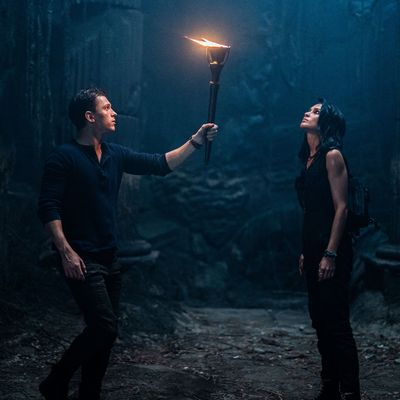
If you, like me, are a sucker for movies with dimly lit, cobweb-covered secret passages, then Uncharted offers something of a mixed bag. On the one hand, it’s a movie positively filled with dimly lit, cobweb-covered secret passages. On the other hand, such scenes are often presented so unimaginatively that they lack what we’re really looking for when we look for dimly lit, cobweb-covered secret passages: atmosphere and mystery.
Uncharted, directed by Ruben Fleischer and starring Mark Wahlberg and Tom Holland as a pair of adventurers traversing the world looking for lost treasure, is based on the popular video game, and you can sort of tell. It has the paint-by-numbers approach to character that often afflicts video-game movies, as if the filmmakers were worried that making their protagonists too distinctive might prevent us from being able to see ourselves in them. After all, spiritually speaking, if this is a game, we should be the ones playing it, right? (Paul W.S. Anderson’s Resident Evil managed to turn this quality into an asset by giving us a blank-slate hero whose mind had been wiped clean.)
As it is, the protagonists of Uncharted are blandly likable but not particularly interesting: Victor Sullivan (Wahlberg) is a globe-trotting veteran fortune hunter who connects with the younger Nate Drake (Holland), whom he finds working as a bartender and pickpocketing his customers. Victor (a.k.a. Sully), it turns out, used to work with Nate’s older brother, Sam (who went missing years ago, and whom we see in the film’s opening flashback saying good-bye to the young Nate), and wants Nate to join him in tracking down a legendary hidden treasure purported to have been found centuries ago by the explorer Ferdinand Magellan’s crew. Also looking for the treasure is Santiago Moncada (Antonio Banderas), a wealthy descendant of the family that funded Magellan’s original expedition, as well two other mercenary fortune hunters, Jo Braddock (Tati Gabrielle) and Chloe Frazer (Sophia Ali), both of whom have histories with Sully.
That’s not an unpromising setup: Everybody’s a thief, and they all distrust one another. But aside from a couple of predictable twists in allegiance, the script (by Rafe Lee Judkins, Art Marcum, and Matt Holloway) does relatively little with that idea, in part because the story feels like it has been cobbled together from snippets of more accomplished movies: A little Pirates of the Caribbean and National Treasure here, a little Indiana Jones and the Last Crusade and The Goonies there. Uncharted has been in the works for some years, with all sorts of big-name filmmakers and actors attached to it, which might explain the hodgepodge of references and influences. Derivativeness in and of itself is not a bad thing, but the movie seems uninterested in delivering any real surprises or creating any distinctive mood of its own.
Maybe it’s a video-game thing. Each scene in Uncharted seems to wipe clean the memory of the previous one. A bad guy left behind in another room doesn’t feel like much of a threat once you enter a new room. We’re told our heroes are brilliant, but that’s not really reflected in any of their banter. (“Holy shit” seems to be the go-to exclamation.) Nobody ever seems to use their wits, just the objects they possess. And none of the solutions to any of the film’s mysteries is particularly clever; they feel like they’re just there to advance our characters to the next plot point. (Surely the combined brainpower and salaries of all the screenwriters who have worked on this project over the past decade-plus could have come up with something more imaginative than … invisible ink?) Even the backstory of Nate’s brother, Sam, and the young man’s sorrow at his disappearance feel more like a dutiful bit of box-checking than anything that might provide emotional resonance. Maybe such disconnects happen because the film is obsessed with forward momentum. And it does bounce along fairly well; Uncharted is nothing if not fast. Alas, the movie rarely builds any real menace, so any excitement it might generate dissipates rather quickly.
There are two notable exceptions to the picture’s general sense of competent, corporate anonymity. Banderas does manage to give his character an entertainingly nasty sense of entitlement and gets some interesting (albeit brief) emotional shading in scenes with his aging, wealthy, idealistic father (Manuel de Blas). There’s also a tremendous climactic action sequence, involving a massive helicopter-and-pirate-ship chase, which delivers the kind of spectacle the rest of the film lacks. It’s intricate, exciting, even surprising; the whole movie might be worth it for that sequence alone. But such high points also serve to remind us of what we’ve been missing. Uncharted is not so much unenjoyable as it is curiously empty.
More Movie Reviews
- The Accountant 2 Can Not Be Taken Seriously
- Another Simple Favor Is So Fun, Until It Gets So Dumb
- Errol Morris Has Been Sucked Into the Gaping Maw of True Crime


